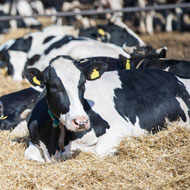
Parasite is a growing issue for farmers
More effective control of liver fluke is essential to maximise outputs for both beef and dairy herds in the UK, according to a study led by the University of Liverpool.
The study examines the root causes and financial implications of liver fluke in cattle and sheep.
So far it has found liver fluke present in as much as 80 per cent of the national dairy herd, and that high fluke dairy herds produce 1,100kg milk per cow per lactation less than low fluke herds.
A similar negative financial impact has been demonstrated in the beef and sheep industries from this parasite.
Liver fluke is a growing issue for famers. The parasite thrives in wet, muddy conditions and the UK's changing climate - wetter and milder winters - is only adding to the problem.
So far the University of Liverpool's project has centred around early detection and identifying where the parasite is most likely to be found.
Now work is underway to provide specific details of the best, most cost-effective way to monitor herds for infection.
It has been suggested by the Moredun Research Institute that the best way of identifying infected herds through composite egg counts.
In addition, the Centre for Ecology and Hydrology has shown that more snails, the parasite's vector, are found in unimproved pasture where rushes and water flushes are found.
Their work also showed that cattle spend most time grazing pastures containing sparsely distributed rushes. However, dung tends to be dropped in wet flushes and water bodies where snails are more commonly found.
In 2014, in order to identify factors that increase a farm's risk of infection, 200 farms in Shropshire had their cattle sampled and completed a detailed questionnaire on farm management, pasture use and other relevant information.
Of the farms tested, 42.5 per cent were fluke positive by composite egg count. 2014 was considered to be a relatively low risk year for fluke, showing just how common the parasite is in UK cattle.
The research is funded by The Biotechnology and Biological Sciences Research Council (BBSRC), AHDB Beef & Lamb, AHDB Dairy, HCC (Meat Promotion Wales), Quality Meat Scotland (QMS) and Agrisearch Northern Ireland.
The final stage of the project will involve estimating the economic impact of fluke on the UK cattle industry.



 The Veterinary Medicines Directorate (VMD) is inviting applications from veterinary students to attend a one-week extramural studies (EMS) placement in July 2026.
The Veterinary Medicines Directorate (VMD) is inviting applications from veterinary students to attend a one-week extramural studies (EMS) placement in July 2026.